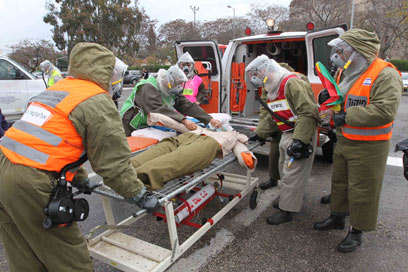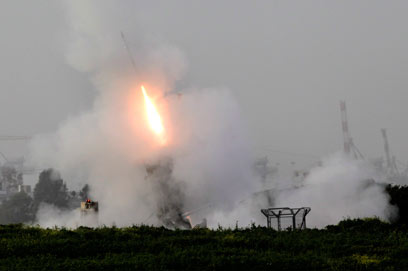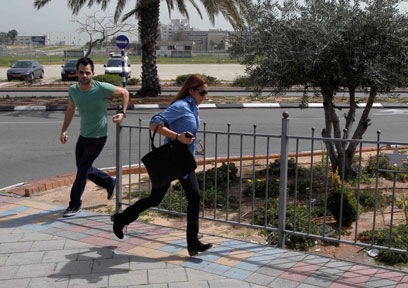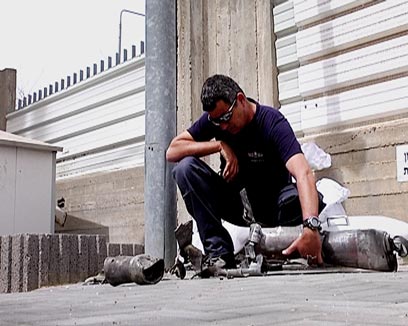



Moreover, 40% of the population will not have gas masks and in most schools there is not enough room to harbor all of the students. These statistics only increase the gaps between wealthy municipalities and poverty-stricken ones, officials say.
Related stories:
- Steinitz: SWIFT sanctions may lead to Iran's economic collapse
- Op-ed: Israeli deterrence gone?
- Escalation in south makes portable shelters all the rage
Experts agree that the Israeli home front will be the focus in any attack scenario against Iran's nuclear facilities, but situation assessments show that not a lot has been done to improve the local defense abilities.

Home Front Command drill (Photo: Ido Erez)
Even if the government renews production and allocates some NIS 1.2 billion ($320 million) to the only two factories working in Israel to manufacture the necessary protection devices, they still would not be able to catch up and make up for lost time.
Itai Bar-On, deputy general manager at one of these factories told the "Washington Post" that the production line is only functioning at 7% capacity. He added that about a third of the factory's employees have been laid off in recent months.

Iron Dome near Ashdod (Photo: EPA)
Moreover, approximately 60% of Israel's public bomb shelters were found unfit in a recent examination conducted by Home Front Command officials. Hundreds of mobile shelters are needed in Israel's southern communities, a worrying figure considering the recent escalation and rocket attacks on the area.
Many of Beersheba's older neighborhoods have been left defenseless, just like many educational institutes in Ofakim, Ashdod and Ashkelon. These municipalities have asked the government to provide them with portable shelters. Given the recent rocket attacks from Gaza, Rishon Lezion, Rehovot and Ramla have also taken interest in such shelters.

Rocket explodes in Netivot (Photo: Eliad Levy)
"There are some 1.7 million residents living in Israel who don't have a bomb shelter or a bunker," cautioned chairman of the Foreign Affairs and Defense Subcommitteefor the Examination of Home Front Readiness, MK Zeev Bielski (Kadima).
"We're talking about some 400,000 homes and apartments, most of which were built in the 1950s… In case a war breaks out, these residents will be told: 'Sit under a doorpost.'"

Handing out gas masks (Photo: AP)
"Israel has made a great effort to coordinate between the different emergency forces. But this urgency was not realized in the budgets. We must change the Israeli way of thinking regarding this issue," a Home Front Command official told an American newspaper.
According to Bielski, the Home Front Command recently presented a new project intended to protect stairwells in older buildings, but the project was not carried out due to budgetary issues.

Running to bomb shelter in Ashdod (Photo: Reuters)
"This is only the beginning," he said. "The biggest scandal involves ABC (atomic, biological and chemical protection) kits. The State of Israel has issued ABC kits to anyone who demands them, fully knowing there are not enough gas masks to go around. It must be made clear that this is not an off-the-shelf product and we cannot order it from other countries.
"I visited the factory in Kiryat Gat, where the production line has already been wrapped in nylon. If, god forbid, an emergency situation was to occur, mayhem will break out. The way things look now, lawyers should be hired for the next inquiry committee," Bielski concluded.

Sapper in southern Israel (Photo: Oz Maron)
Another major failure on the ground has to do with the financial gaps between local authorities in the country.
"There is a direct connection between financial stability and a community's readiness as far as bomb shelters and bunkers go," Beit Aryeh Council Head Avi Naim. "Tel Aviv, Rishon Lezion, Ranana and Herzliya have better protection than the periphery, the Arab sector or poor cities like Bnei Brak, Ramla and Lod."
'Third world country'
Such gaps also can be found in Tel Aviv's southern neighborhoods. "We're not part of Israel, we live in a third world country. It might be both funny and sad to think that Bibi (Netanyahu) is ready to go to Iran, but southern Tel Aviv is just too far for him," remarked Habiba Ezra, a resident of Tel Aviv's Neve Shaanan neighborhood.
"There are no shelters here, only garages. There is no one to talk to," she added.
The financial gaps in Israel's society are also apparent across educational institutes. "Many schools don't have enough space to shelter all of the students," explained Avi Kaminsky, union chairman for the directors of the education department.
As for Israel's northern communities, lessons have been learned after the Second Lebanon War in 2006. Some 550 shelters were renovated in the Upper Galilee and turned into public shelters in 2008.
Haifa Mayor Yona Yahav insisted that his city has been getting ready for various scenarios. "Since 2006 we have been intensively busy making arrangements… preparing for difficult events," he stated.
"It'll cost billions to decrease these gaps, and this money will come out of the education, welfare or Trachtenberg budgets, but it's non-existent. Even if it did exist, its contribution would be mostly psychological," a defense official concluded.
Yoav Zitun, Moran Azulay, Gilad Morag, Boaz Fyler, Ahiya Raved, Maor Buchnik and Tomer Velmer contributed to this report
- Receive Ynetnews updates
directly to your desktop















